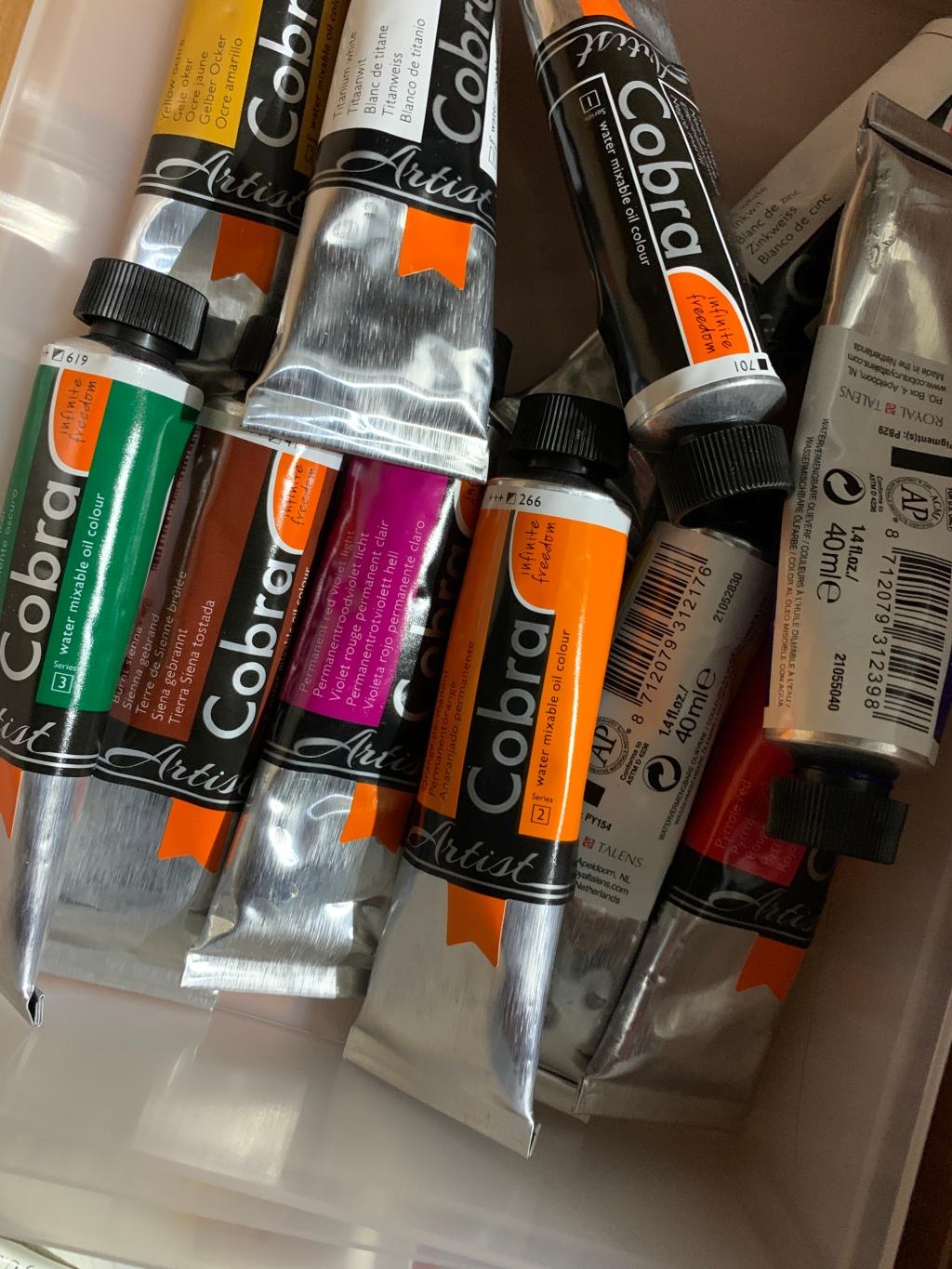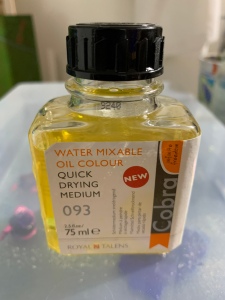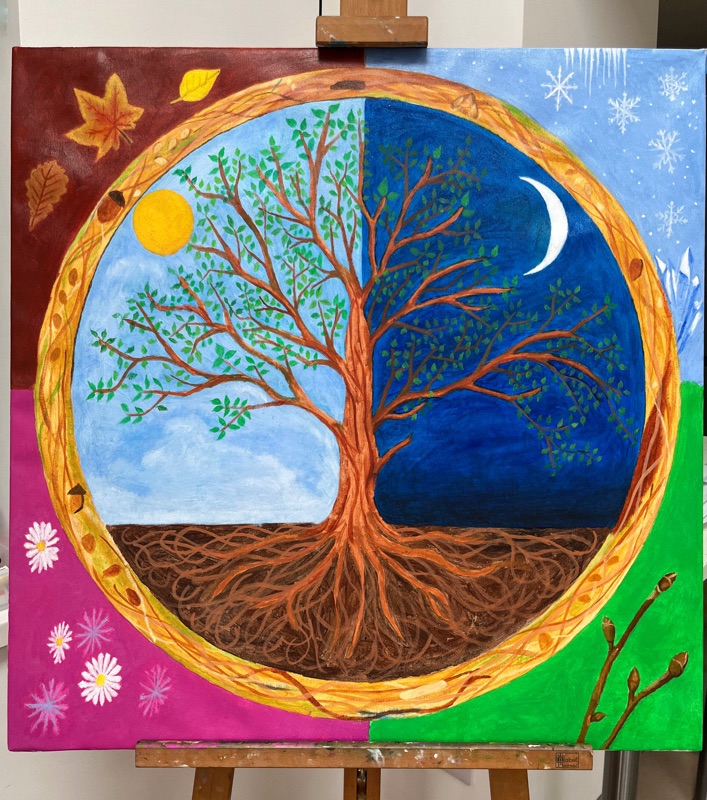Recently I tried some Cobra Water mixable or water soluble oil paints and here are my thoughts on them.
Water based oil paints have been an impossibility for the past thousand or more years that oils have been in use. Some of the earliest oil paintings ever found are murals painted in Afghanistan in circa 650 AD, though oil painting may go back much further than that.
Since Renaissance times oil paints have been mostly based on linseed oil which is made from cotton seeds. It creates a transparent medium in which to mix pigments to make paint.
Modern chemistry has developed linseed oil that is modified at the molecular level to be mixable with ordinary tap water. This is a huge boon to artists who are allergic to or repelled by the pungent, poisonous and environmentally unfriendly solvents used in traditional oil paints. One such solvent is turpentine - its smells can get into the clothes and furnishings in a room and ditto for white spirits, a popular but almost as noxious substitute for turpentine. And if little Johnny should accidentally drink some solvent during his painting lesson it's a frantic trip to hospital for stomach pumping and recuperation. So there is a clear market for oil paints that can be thinned with harmless, odourless, plentiful water.
Oil based paints are favoured for their beautiful colours, which do not shift as they dry, unlike modern alternatives such as acrylics. Oil colours also look more natural on the painted surface than acrylics, which have a luminosity that borders on garish.
So for painters familiar with traditional oils how do water based oil paints handle? Is it necessary to change one's painting technique? That might be a deal breaker for many artists who know exactly what they can do with their favourite oil brands and colours.

This appraisal is based on my experience with one brand of water mixable oils: Cobra by the renowned Dutch company Talens. These are marketed as true artist quality single pigment colours. So let's see how they perform in the studio.
I used the following colours:
- Permanent Yellow Light
- Zinc White
- Titanium White
- Ultramarine
- Permanent Green Deep
- Pyrrole Red Light
- Burnt Sienna
- Permanent Orange
- Permanent Lemon Yellow
- King's Blue
- Yellow Ochre
- Primary Magenta
- Permanent Red Violet Light
To begin, out of the tube water based oils handle similarly to traditional oils. They have the same consistency as the average oil paint brand. Not as stiff as the famed Old Holland brand but less fluid than Sennelier or Schmincke. So paint handling is fine.
On thinning the paints with water they handle slightly differently to oils thinned with turpentine. The water seems to evaporate quickly and the consistency of the paint soon returns to its original state. This makes it difficult to paint fine detail when the paint is thinned only with water.
The paints adhere well to primed canvas and can be painted in layers. As far as I can see successive layers of paint do not interfere with previous layers.
Drying times for the paint layers are as advertised - they dry quickly in a couple of days - maybe too quickly for artists who like wet in wet techniques. On the palette the paints dry after about three days which is faster than I would like.

Talens makes a water mixable medium for its Cobra range and this handles just like a standard linseed oil medium with a tendency to the thicker side of linseed oil if not as thick as linseed stand oil. This medium can itself be thinned with water. It isn't as nice to paint with as traditional mediums made from solvent, linseed oil and damar resin.
Overall the handling of water-based oils when painting is not as smooth as oils and traditional mediums. Water does not thin the paints to those wonderful oily mixtures which we paint onto our canvases. In this respect water-based oils remind me of slow drying acrylics.
I noticed that when mixing the paints on the pallete sometimes the darker colours seemed to lighten, but when applied to the canvas this corrected itself.
Water based oils can intermix with traditional oils and their mediums but I did not try this as it seems to negate their advantages. Rather than do this one may as well just stick with traditional oils it seems to me.
I use acrylics for underpainting and there I can see potential uses for water mixable oils. It depends if one wants the rapid drying times of acrylic underpainting, which many artists do. I would say that these oils offer the advantage of an underpainting which dries to exactly the colour values the artist intended.
Obviously I can only judge the Cobra brand here but the pigment load seems more in the range of student colours than artist quality. I found that the paints did not have the same covering power as Sennelier, Old Holland, Winsor and Newton Artist's or Michael Harding ranges of traditional oils. This raises the question that these type of paints might be pitched more at the hobby market than the professional one.
On my first attempt with water based oils I have been able to mix all of the tints, values and shades I needed for my painting and cannot see any problems with the paints. Colours mix in exactly the same way as with traditional oils.

I used synthetic brushes for the painting I did as I did not want to risk my precious sable and hog brushes until I had got the measure of this novel new medium! Synthetic brushes seem to work well with these paints and may also last longer as there are no solvents needed to clean them. This could be a big win for artists who prefer synthetic brushes. I have had a hard time trying to get synthetic brushes, even taklon ones, to endure the rigours of solvent-based oil painting.
Cleaning up after use is a joy with these water-based oil paints! This could make them a huge hit at schools and colleges in addition to the previously mentioned absence of nasty solvents. I used a little washing-up liquid in water and my synthetic brushes easily washed clean. The paints washed off of my hands just as easily with soap and water.
Overall I recommend Cobra water based oils to artists who want reasonably priced solvent free oil painting or relatively quick non-acrylic underpainting. I would also check out other competing brands such as Holbein Duo or Winsor & Newton Artisan. For professional artists the Holbein paints are said to be very high quality but I cannot confirm that as I have not tried them.
Slow drying acrylics might also be worth a try as these in some ways handle similarly to water-based oils. I have been very impressed with Golden Open acrylics and wrote a review here.
May I point out that this article is not sponsored by Talens or anyone else.
I hope you have enjoyed my article and feel free to add comments below. Here are details of another, later, painting in water-mixable oil - a tree of life - which I have been working on.







